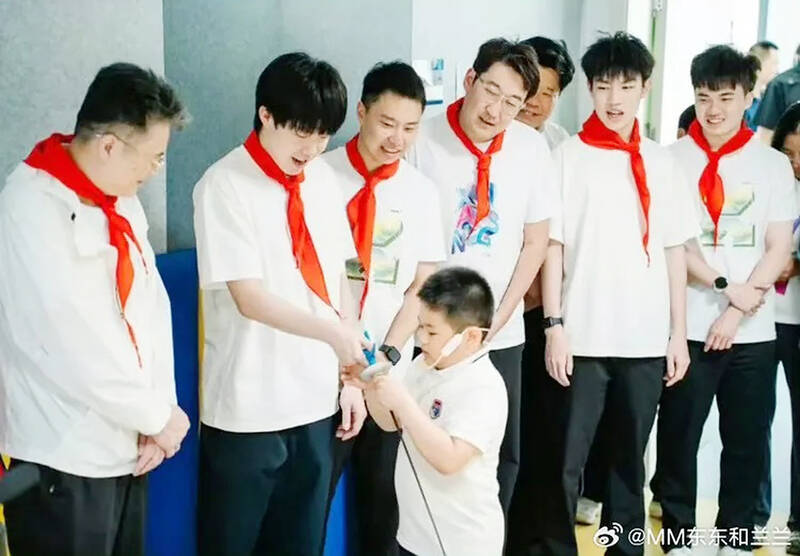The Mainland Affairs Council (MAC) on Thursday called on Chinese authorities not to use sports exchanges for “united front” propaganda, after Taiwanese table tennis player Lin Yun-ju (林昀儒) appeared at an event in China recently wearing a red scarf linked to the Chinese Young Pioneers.
MAC Deputy Minister and spokesman Liang Wen-chieh (梁文傑) said that the council believes that the Chinese side had “arranged” for Lin to participate in the pregame event.
“We believe this was an attempt by the Chinese Communist Party [CCP] to use the incident for ‘united front’ propaganda,” he told a regular news briefing in Taipei.

Photo from Sina Weibo
Lin was “unknowingly” made to wear a red scarf typically worn by Chinese elementary students and was “manipulated” into singing a united front-themed song with others during a pre-game event in the Chinese province of Shandong, the council said in a statement on Wednesday.
The participation of Lin — Taiwan’s top-ranked male paddler — was “deliberately publicized” by Chinese authorities, the MAC said.
Cross-strait professional exchanges should not involve political or “united front” arrangements, it said.
“However, the CCP often uses various exchange occasions to carry out ‘united front’ propaganda, undermining the original intent of such exchanges — an approach that does nothing to improve cross-strait interaction,” the council added.
The MAC’s response came after photos and videos of Lin wearing a red scarf and interacting with elementary-school students in China circulated online and drew public attention.
The red scarf is a symbol of membership in the Chinese Young Pioneers, a national mass organization for children in China operated under the CCP-led Communist Youth League of China.
In a video posted on Sina Weibo on Wednesday, Lin was seen holding hands with students, who were all wearing red scarves and singing the song I Love You, China (我愛你,中國).
Lin’s teammates at the Shandong Weiqiao Table Tennis Club, including Olympic gold medalist Wang Chuqin (王楚欽), were also seen wearing red scarves at the event.
The Shandong club won the men’s team title in last year’s Chinese Table Tennis Super League, with Lin as part of the championship squad.
Article 33-1 of the Act Governing Relations Between the People of the Taiwan Area and the Mainland Area (臺灣地區與大陸地區人民關係條例) prohibits Taiwanese from engaging in “any form of cooperative activity with the agencies, institutions or organizations of the Mainland Area which are political parties, the military, the administration or of any political nature.”
While it remains unclear whether Lin is to be investigated or penalized under Article 33-1 for his participation in the event, a report by Chinese-language news outlet ETtoday on Wednesday cited an unnamed official as saying that Lin had been pushed into the situation without prior knowledge.
The report cited the official as saying that Lin had sensed something was inappropriate at the scene and voiced his concerns.
Lin’s agent on Wednesday told the Chinese-language newspaper Liberty Times (sister paper of the Taipei Times) that Lin went to Shandong solely to compete and had no other purpose, adding that he would stay focused on the competition.
“It was simply a decision to accept the competition invitation,” the agent added.

The manufacture of the remaining 28 M1A2T Abrams tanks Taiwan purchased from the US has recently been completed, and they are expected to be delivered within the next one to two months, a source said yesterday. The Ministry of National Defense is arranging cargo ships to transport the tanks to Taiwan as soon as possible, said the source, who is familiar with the matter. The estimated arrival time ranges from late this month to early next month, the source said. The 28 Abrams tanks make up the third and final batch of a total of 108 tanks, valued at about NT$40.5 billion

Two Taiwanese prosecutors were questioned by Chinese security personnel at their hotel during a trip to China’s Henan Province this month, the Mainland Affairs Council (MAC) said yesterday. The officers had personal information on the prosecutors, including “when they were assigned to their posts, their work locations and job titles,” MAC Deputy Minister and spokesman Liang Wen-chieh (梁文傑) said. On top of asking about their agencies and positions, the officers also questioned the prosecutors about the Cross-Strait Joint Crime-Fighting and Judicial Mutual Assistance Agreement, a pact that serves as the framework for Taiwan-China cooperation on combating crime and providing judicial assistance, Liang

A group from the Taiwanese Designers in Australia association yesterday represented Taiwan at the Midsumma Pride March in Melbourne. The march, held in the St. Kilda suburb, is the city’s largest LGBTQIA+ parade and the flagship event of the annual Midsumma Festival. It attracted more than 45,000 spectators who supported the 400 groups and 10,000 marchers that participated this year, the association said. Taiwanese Designers said they organized a team to march for Taiwan this year, joining politicians, government agencies, professionals and community organizations in showing support for LGBTQIA+ people and diverse communities. As the first country in Asia to legalize same-sex

MOTIVES QUESTIONED The PLA considers Xi’s policies toward Taiwan to be driven by personal considerations rather than military assessment, the Epoch Times reports Chinese President Xi Jinping’s (習近平) latest purge of the Chinese People’s Liberation Army (PLA) leadership might have been prompted by the military’s opposition to plans of invading Taiwan, the Epoch Times said. The Chinese military opposes waging war against Taiwan by a large consensus, putting it at odds with Xi’s vision, the Falun Gong-affiliated daily said in a report on Thursday, citing anonymous sources with insight into the PLA’s inner workings. The opposition is not the opinion of a few generals, but a widely shared view among the PLA cadre, the Epoch Times cited them as saying. “Chinese forces know full well that